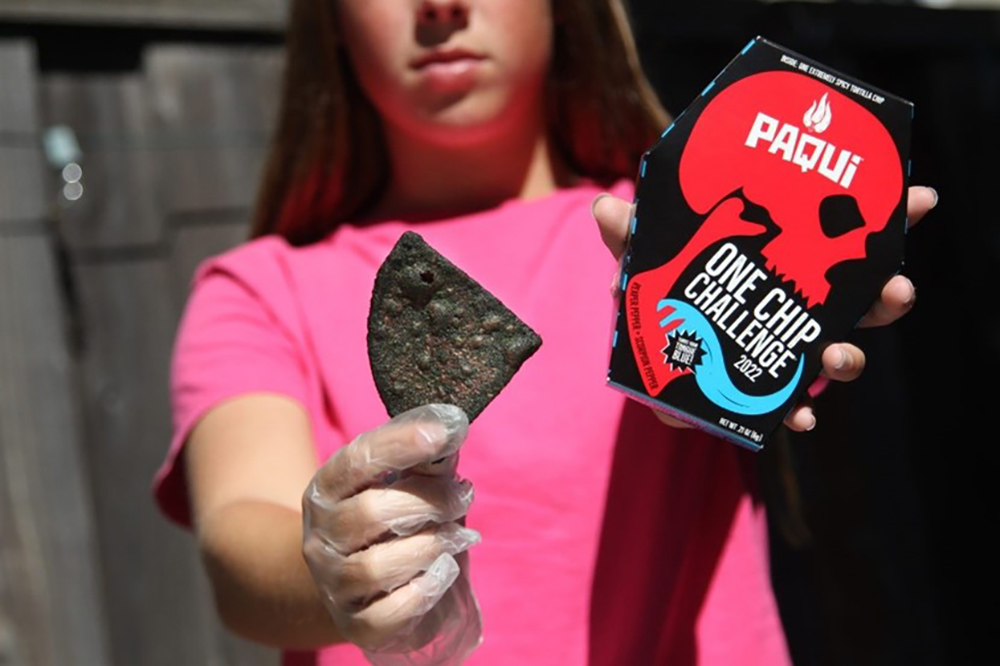
美國(guó)馬薩諸塞州一起事件近期震驚了社會(huì),14歲的哈里斯·沃羅巴(Harris Wolobah)因挑戰(zhàn)食用全球最辣的薯片而被“辣死”,。
在沃羅巴死亡后,,一家玉米片制造商決定將其超辛辣產(chǎn)品“一片薯片挑戰(zhàn)”下架,這再次引起了人們對(duì)類(lèi)似挑戰(zhàn)(由品牌營(yíng)銷(xiāo)并在網(wǎng)上廣泛傳播)的受歡迎程度和風(fēng)險(xiǎn)的關(guān)注,。
辛辣食物挑戰(zhàn)賽已經(jīng)存在多年了,。從當(dāng)?shù)氐某岳苯繁荣惖讲宛^為那些吃完超辣菜肴的人設(shè)立的名人墻,世界各地的人們都在挑戰(zhàn)彼此,,看誰(shuí)有膽量吃下超辣的食物,。一些專(zhuān)家指出,這源自人們內(nèi)在的競(jìng)爭(zhēng)和冒險(xiǎn)沖動(dòng),。
但佛羅里達(dá)國(guó)際大學(xué)心理學(xué)副教授艾麗莎·特魯科(Elisa Trucco)說(shuō),,但專(zhuān)為挑戰(zhàn)賽和(有可能)網(wǎng)絡(luò)成名而生產(chǎn)和銷(xiāo)售的超辣產(chǎn)品卻是最近才出現(xiàn)的,而且由于社交媒體,,青少年尤其容易接觸到這些產(chǎn)品,。
特魯科說(shuō):“在社交媒體上,這些挑戰(zhàn)被美化了,。你會(huì)發(fā)現(xiàn)很多人‘點(diǎn)贊’或是評(píng)論這些挑戰(zhàn)賽(彰顯社會(huì)地位或受歡迎程度),,但你無(wú)法看到很多負(fù)面后果——比如去急診室或是造成其他傷害。”
美國(guó)東北大學(xué)(Northeastern University)市場(chǎng)營(yíng)銷(xiāo)學(xué)副教授亞歷山大·德保利(Alexander DePaoli)補(bǔ)充說(shuō),,人們可能會(huì)忍受痛苦完成挑戰(zhàn)并在網(wǎng)上分享,,以獲得一種“群體歸屬感”,類(lèi)似于現(xiàn)實(shí)生活中的真心話大冒險(xiǎn)游戲,。
例如,,幾年前,YouTube上一個(gè)名為“挑戰(zhàn)超辣雞翅”的系列視頻在網(wǎng)上走紅,,視頻記錄了明星們吃辣雞翅后的反應(yīng),。與此同時(shí),全國(guó)各地的餐廳也在不斷提供現(xiàn)場(chǎng)挑戰(zhàn)活動(dòng)——從布法羅野生雞翅餐廳“Blazin”挑戰(zhàn)賽(Blazin' 醬汁是布法羅野生雞翅餐廳最辣的醬汁)到拉斯維加斯雞翅之王餐廳的“地獄挑戰(zhàn)賽”(Hell Challenge),。在這兩項(xiàng)挑戰(zhàn)中,,年滿18歲的顧客可以嘗試在不喝酒或不吃其他食物的情況下,在限定時(shí)間內(nèi)吃掉一定量的澆上超辣醬汁的雞翅,。
世界各地也定期舉辦吃辣椒比賽,。去年,格雷戈里·福斯特(Gregory Foste)在加州圣地亞哥創(chuàng)下33.15秒吃掉10個(gè)卡羅萊納死神辣椒的記錄(卡羅萊納死神辣椒被吉尼斯世界紀(jì)錄認(rèn)證機(jī)構(gòu)認(rèn)定為世界最辣的辣椒),。
在大多數(shù)情況下,,人們會(huì)選擇參加那些他們受過(guò)訓(xùn)練或是認(rèn)為并非真正危險(xiǎn)的挑戰(zhàn)。但德保利指出,,當(dāng)有人受到傷害時(shí),,就越過(guò)紅線了。
雖然10年級(jí)學(xué)生沃羅巴的尸檢結(jié)果尚未公布,,但這名青少年的家人聲稱(chēng),,“一片薯片挑戰(zhàn)”是導(dǎo)致他9月1日死亡的罪魁禍?zhǔn)住_@款產(chǎn)品是由Paqui公司生產(chǎn)的,,提示參與者試吃“一片薯片挑戰(zhàn)”薯片,,然后看看他們?cè)诓怀云渌澄锖筒缓人那闆r下能堅(jiān)持多久。
這種薯片的銷(xiāo)售似乎主要靠人們?cè)谏缃幻襟w上發(fā)布自己或朋友接受挑戰(zhàn)的視頻來(lái)帶動(dòng),。這些視頻展示了人們(包括青少年和兒童)吃薯片后對(duì)辣味做出的反應(yīng),。一些視頻顯示人們嘔吐、咳嗽,,并討水喝,。
自從沃洛巴死后,Paqui公司已經(jīng)要求零售商停止銷(xiāo)售這種產(chǎn)品,。一些健康專(zhuān)家也指出,,在某些情況下食用這種辛辣產(chǎn)品存在潛在危險(xiǎn),尤其取決于辣椒素的含量(辣椒素是辣味的決定因素),。
但是,,網(wǎng)上和商店貨架上仍有許多類(lèi)似產(chǎn)品,,包括Red Hot Reaper的"一片薯片挑戰(zhàn)"、Blazing Foods的"死亡堅(jiān)果挑戰(zhàn)"和"恐怖玉米堅(jiān)果挑戰(zhàn)"以及Wilder Toys的"真心話大冒險(xiǎn)游戲辣醬",。在Paqui公司撤下自己的產(chǎn)品后,,美聯(lián)社聯(lián)系了上述公司,但沒(méi)有收到回復(fù),。
德保利說(shuō),,公司進(jìn)行病毒式營(yíng)銷(xiāo)并不罕見(jiàn)。
他說(shuō):“然而,,品牌真的希望你攝入某些食物并不常見(jiàn),。” 公司“不想為此承擔(dān)責(zé)任”,。
特魯科補(bǔ)充說(shuō),盡管警告或標(biāo)簽上注明僅供成人使用,,這些產(chǎn)品仍然可能落入不太了解其風(fēng)險(xiǎn)的青少年手中,。
她說(shuō):“這些挑戰(zhàn)之所以吸引人,是有原因的,。這種營(yíng)銷(xiāo)方式能促進(jìn)銷(xiāo)售,。”(財(cái)富中文網(wǎng))
譯者:中慧言-王芳
辛辣食物挑戰(zhàn)賽不僅僅是輕松愉快的娛樂(lè)活動(dòng),。
美國(guó)馬薩諸塞州一起事件近期震驚了社會(huì),,14歲的哈里斯·沃羅巴(Harris Wolobah)因挑戰(zhàn)食用全球最辣的薯片而被“辣死”。
在沃羅巴死亡后,,一家玉米片制造商決定將其超辛辣產(chǎn)品“一片薯片挑戰(zhàn)”下架,,這再次引起了人們對(duì)類(lèi)似挑戰(zhàn)(由品牌營(yíng)銷(xiāo)并在網(wǎng)上廣泛傳播)的受歡迎程度和風(fēng)險(xiǎn)的關(guān)注。
辛辣食物挑戰(zhàn)賽已經(jīng)存在多年了,。從當(dāng)?shù)氐某岳苯繁荣惖讲宛^為那些吃完超辣菜肴的人設(shè)立的名人墻,,世界各地的人們都在挑戰(zhàn)彼此,看誰(shuí)有膽量吃下超辣的食物,。一些專(zhuān)家指出,,這源自人們內(nèi)在的競(jìng)爭(zhēng)和冒險(xiǎn)沖動(dòng)。
但佛羅里達(dá)國(guó)際大學(xué)心理學(xué)副教授艾麗莎·特魯科(Elisa Trucco)說(shuō),,但專(zhuān)為挑戰(zhàn)賽和(有可能)網(wǎng)絡(luò)成名而生產(chǎn)和銷(xiāo)售的超辣產(chǎn)品卻是最近才出現(xiàn)的,,而且由于社交媒體,青少年尤其容易接觸到這些產(chǎn)品,。
特魯科說(shuō):“在社交媒體上,,這些挑戰(zhàn)被美化了。你會(huì)發(fā)現(xiàn)很多人‘點(diǎn)贊’或是評(píng)論這些挑戰(zhàn)賽(彰顯社會(huì)地位或受歡迎程度),,但你無(wú)法看到很多負(fù)面后果——比如去急診室或是造成其他傷害,。”
美國(guó)東北大學(xué)(Northeastern University)市場(chǎng)營(yíng)銷(xiāo)學(xué)副教授亞歷山大·德保利(Alexander DePaoli)補(bǔ)充說(shuō),人們可能會(huì)忍受痛苦完成挑戰(zhàn)并在網(wǎng)上分享,,以獲得一種“群體歸屬感”,,類(lèi)似于現(xiàn)實(shí)生活中的真心話大冒險(xiǎn)游戲。
例如,,幾年前,,YouTube上一個(gè)名為“挑戰(zhàn)超辣雞翅”的系列視頻在網(wǎng)上走紅,視頻記錄了明星們吃辣雞翅后的反應(yīng),。與此同時(shí),,全國(guó)各地的餐廳也在不斷提供現(xiàn)場(chǎng)挑戰(zhàn)活動(dòng)——從布法羅野生雞翅餐廳“Blazin”挑戰(zhàn)賽(Blazin' 醬汁是布法羅野生雞翅餐廳最辣的醬汁)到拉斯維加斯雞翅之王餐廳的“地獄挑戰(zhàn)賽”(Hell Challenge)。在這兩項(xiàng)挑戰(zhàn)中,,年滿18歲的顧客可以嘗試在不喝酒或不吃其他食物的情況下,,在限定時(shí)間內(nèi)吃掉一定量的澆上超辣醬汁的雞翅。
世界各地也定期舉辦吃辣椒比賽,。去年,,格雷戈里·福斯特(Gregory Foste)在加州圣地亞哥創(chuàng)下33.15秒吃掉10個(gè)卡羅萊納死神辣椒的記錄(卡羅萊納死神辣椒被吉尼斯世界紀(jì)錄認(rèn)證機(jī)構(gòu)認(rèn)定為世界最辣的辣椒)。
在大多數(shù)情況下,,人們會(huì)選擇參加那些他們受過(guò)訓(xùn)練或是認(rèn)為并非真正危險(xiǎn)的挑戰(zhàn),。但德保利指出,當(dāng)有人受到傷害時(shí),,就越過(guò)紅線了,。
雖然10年級(jí)學(xué)生沃羅巴的尸檢結(jié)果尚未公布,但這名青少年的家人聲稱(chēng),,“一片薯片挑戰(zhàn)”是導(dǎo)致他9月1日死亡的罪魁禍?zhǔn)?。這款產(chǎn)品是由Paqui公司生產(chǎn)的,提示參與者試吃“一片薯片挑戰(zhàn)”薯片,,然后看看他們?cè)诓怀云渌澄锖筒缓人那闆r下能堅(jiān)持多久,。
這種薯片的銷(xiāo)售似乎主要靠人們?cè)谏缃幻襟w上發(fā)布自己或朋友接受挑戰(zhàn)的視頻來(lái)帶動(dòng)。這些視頻展示了人們(包括青少年和兒童)吃薯片后對(duì)辣味做出的反應(yīng),。一些視頻顯示人們嘔吐,、咳嗽,并討水喝,。
自從沃洛巴死后,,Paqui公司已經(jīng)要求零售商停止銷(xiāo)售這種產(chǎn)品。一些健康專(zhuān)家也指出,,在某些情況下食用這種辛辣產(chǎn)品存在潛在危險(xiǎn),,尤其取決于辣椒素的含量(辣椒素是辣味的決定因素)。
但是,,網(wǎng)上和商店貨架上仍有許多類(lèi)似產(chǎn)品,,包括Red Hot Reaper的"一片薯片挑戰(zhàn)",、Blazing Foods的"死亡堅(jiān)果挑戰(zhàn)"和"恐怖玉米堅(jiān)果挑戰(zhàn)"以及Wilder Toys的"真心話大冒險(xiǎn)游戲辣醬"。在Paqui公司撤下自己的產(chǎn)品后,,美聯(lián)社聯(lián)系了上述公司,,但沒(méi)有收到回復(fù)。
德保利說(shuō),,公司進(jìn)行病毒式營(yíng)銷(xiāo)并不罕見(jiàn),。
他說(shuō):“然而,品牌真的希望你攝入某些食物并不常見(jiàn),?!?公司“不想為此承擔(dān)責(zé)任”。
特魯科補(bǔ)充說(shuō),,盡管警告或標(biāo)簽上注明僅供成人使用,,這些產(chǎn)品仍然可能落入不太了解其風(fēng)險(xiǎn)的青少年手中。
她說(shuō):“這些挑戰(zhàn)之所以吸引人,,是有原因的,。這種營(yíng)銷(xiāo)方式能促進(jìn)銷(xiāo)售?!保ㄘ?cái)富中文網(wǎng))
譯者:中慧言-王芳
A tortilla chip maker’s decision to pull its extremely spicy product sold as a “One Chip Challenge” from store shelves following the death of a Massachusetts teen has renewed attention on the popularity — and risks — of similar dares marketed by brands and spread widely online.
Spicy food challenges have been around for years. From local chile pepper eating contests to restaurant walls of fame for those who finished extra hot dishes, people around the world have been daring each other to eat especially fiery foods, with some experts pointing to the internal rush of competition and risk-taking.
But extremely spicy products created and marketed solely for the challenges — and possible internet fame — is a more recent phenomenon, and teens are particularly exposed to them because of social media, associate professor of psychology at Florida International University Elisa Trucco says.
There’s a “glamorization of these challenges on social media,” Trucco said. “You see a lot of ‘likes’ or comments (indicating) social status or popularity from these challenges, but you don’t see a lot of the negative consequences — like the trips to the E.R. or other injuries.”
Alexander DePaoli, an associate teaching professor of marketing at Northeastern University, added that people may put themselves through discomfort and share it online for a sense of “in-group belonging,” similar to offline challenges as a game of truth or dare.
A YouTube series called “Hot Ones,” for example, rose to internet fame several years ago with videos of celebrities’ reactions to eating spicy wings. Meanwhile, restaurants nationwide continue to offer in-person challenges — from Buffalo Wild Wings’ “Blazin’ Challenge” to the “Hell Challenge” of Wing King in Las Vegas. In both challenges, patrons over 18 can attempt to eat a certain amount of wings doused in extra hot sauce in limited time without drinking or eating other food.
Chile pepper eating contests are also regularly hosted around the world. Last year, Gregory Foster ate 10 Carolina Reaper chillies, which Guinness World Records has named the hottest in the world, at a record time of 33.15 seconds in San Diego, California.
In most cases, people will choose to participate in challenges that they are trained for or don’t consider to be truly dangerous. But a line is crossed when someone gets hurt, DePaoli noted.
While the autopsy results for 10th-grader Harris Wolobah are still pending, the teen’s family allege that the One Chip Challenge is responsible for his Sept. 1 death. The product, manufactured by Paqui, instructs participants to eat an eponymously named chip and then see how long they can go without consuming other food and water.
Sales of the chip seem largely driven by people posting videos on social media of them or their friends taking the challenge. They show people, including teens and children, eating the chips and then reacting to the heat. Some videos show people gagging, coughing and begging for water.
Since Wolobah’s death, Paqui has asked retailers to stop selling the product and some health experts have pointed to potential dangers of eating such spicy products under certain circumstances, particularly depending on the amount of capsaicin, a component that gives chile peppers their heat.
But there are plenty of similar products that remain online and on store shelves, including Red Hot Reaper’s One Chip Challenge, Blazing Foods’ Death Nut Challenge and Tube of Terror Challenge as well as Wilder Toys’ Hot Ones Truth or Dab sauce game. The Associated Press reached out to each company after Paqui pulled its own product, but did not receive a response.
DePaoli said it’s not unusual for companies to engage in viral marketing.
“It is unusual, however, to have something where the brand actually wants you to put something into your body,” he said. Companies “don’t want to be liable for that.”
Despite warnings or labels specifying adult-use only, the products can still get into the hands of young people who might not understand the risks, Trucco added.
“There’s a reason why these challenges are appealing,” she said. “This type of marketing sells.”






